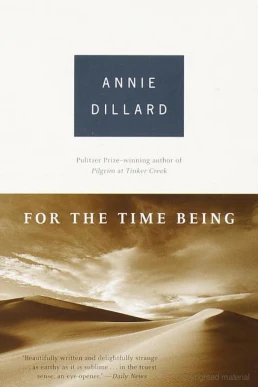Downloading For the Time Being

National Bestseller
"Beautifully written and delightfully strange--. As earthy as it is sublime, For the Time Being is, in the truest sense, an eye- opener."--Daily News
From Annie Dillard, the Pulitzer Prize-winning author of Pilgrim at Tinker Creek and one of the most compelling writers of our time, comes For the Time Being, her most profound narrative to date. With her keen eye, penchant for paradox, and yearning for truth, Dillard renews our ability to discover wonder in life's smallest--and often darkest--corners.
Why do we exist? Where did we come from? How can one person matter? Dillard searches for answers in a powerful array of images: pictures of bird-headed dwarfs in the standard reference of human birth defects; ten thousand terra-cotta figures fashioned for a Chinese emperor in place of the human court that might have followed him into death; the paleontologist and theologian Teilhard de Chardin crossing the Gobi Desert; the dizzying variety of clouds. Vivid, eloquent, haunting, For the Time Being evokes no less than the terrifying grandeur of all that remains tantalizingly and troublingly beyond our understanding.
"Stimulating, humbling, original--. [Dillard] illuminate[s] the human perspective of the world, past, present and future, and the individual's relatively inconsequential but ever so unique place in it."--Rocky Mountain News
From the Trade Paperback edition.
Amazon.com Review
Over the last three decades, Annie Dillard has written about an uncommon number of things--predators and prose, astronomy and evolution, the miraculous survival of mangroves. Yet the sheer range of her interests can be deceptive. Whatever the subject, Dillard is always (as she wrote in Living by Fiction) practicing unlicensed metaphysics in a teacup, always asking the fundamental questions about life and death. And this epistemological interrogation continues in For the Time Being. Here Dillard alternates accounts of her own travels to China and Israel with ruminations on sand, clouds, obstetrics, and Hasidic thought. She also records the wanderings of paleontologist and spade-wielding spiritualist Teilhard de Chardin, whose itinerary (geographical and philosophical) has certain similarities to her own. But as she ties together these disparate threads with truly Emersonian eloquence, it becomes clear that God's presence--or absence--is at the heart of her book.
There are, of course, facts aplenty here: the author is among our keenest living observers of the natural world (check out her soft-core account of two snails mating in chapter 7). But all roads lead Dillard back to God, who seems to be practicing a divine variant of benign neglect:
God is no more cogitating which among us he plans to be born as bird-headed dwarfs or elephant men--or to kill by AIDS or kidney failure, heart disease, childhood leukemia, or sudden infant death syndrome--than he is pitching lightning bolts at pedestrians, triggering rock slides, or setting fires. The very least unlikely things for which God might be responsible are what insurers call "acts of God."
Natural calamity is an old fascination of the author's, going clear back to Pilgrim at Tinker Creek and Holy the Firm. Here it allows her to make her strongest argument yet on behalf of the Almighty's laissez-faire policy--while suggesting that His immanence in fact depends on our belief.
Yet even in her earnest pursuit of holiness, Dillard tends to hit the occasional speed bump. At one point she throws up her hands in exasperation and declares: "I don't know beans about God." This is hardly the stuff of an airtight theological argument, is it? But happily, Dillard possesses the same quality she ascribes to Teilhard, "a sort of anaerobic capacity to batten and thrive on paradox." So her contradictions are worth more to the reader than her consistencies. They enrich her narrative, yanking her back from the precipice of easy (or even moderately easy) belief. And Dillard's penchant for paradox ensures that For the Time Being--which aims, after all, to encompass God and all his works--always operates on a human, heartbreaking scale. --James Marcus
From Publishers Weekly
Writing as if on the edge of a precipice, staring over into the abyss, Dillard offers a risk-taking, inspiring meditation on life, death, birth, God, evil, eternity, the nuclear age and the human predicament. This unconventional mosaic, portions of which were first published in different form in Raritan, Harper's, etc., interweaves several disparate topics: the travels of French paleontologist and Jesuit priest Teilhard de Chardin in China and Mongolia, where his team in 1928 discovered the world's first fossil evidence of pre-Neanderthal humans; the life and teachings of the Baal Shem Tov, the 18th-century Ukrainian Jewish mystic who founded modern Hasidism; a natural history of sand?an epic drama of rocks, glaciers, lichen, rivers?and of individual clouds as witnessed by painters, poets, naturalists, scientists and laypeople. Rounding out this fugue are Dillard's visits to an obstetrical ward to watch healthy newborns emerge; her survey of tragic, horrific human birth defects; random encounters with strangers; her trips to Israel, where she visited Jesus' birthplace, and to China, where, at the tomb of the first Chinese emperor, Qin?mass murderer, burner of books, Mao's idol?she inspected the terra-cotta army of life-size soldiers who guard Qin in the afterlife. Dillard's unifying theme is the congruence of thought she detects in Teilhard, Kabbalists and Gnostics: each impels us to transform, build, complete and grant divinity to the world. Her cosmic perspective can seem like posturing at times, yet it succeeds admirably in forcing us to confront our denial of death, of the world's suffering, of the interconnectedness of all people. Her razor-sharp lyricism hones this mind-expanding existential scrapbook, which is imbued with the same spiritual yearning, moral urgency and reverence for nature that has informed nearly all of her nonfiction since the 1972 Pulitzer Prize-winning Pilgrim at Tinker Creek. 60,000 first printing.
Copyright 1999 Reed Business Information, Inc.
